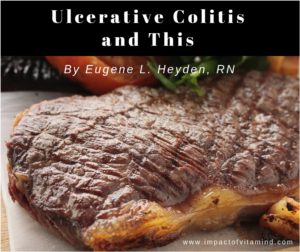Last revision: 10-13-22
By Eugene L. Heyden, RN
I can’t imagine living a life like this. But perhaps you can. I don’t have ulcerative colitis, but perhaps you do. I think I heard someone say, “This is getting old.” I think it was you. Let’s see if we can help you out a little in your struggle against this disease.
To sufficiently motivate you, the ulcerative colitis (UC) patient, I’ll need to start out a little on the negative side. You’re not going to like this:
“Modern-day therapeutics for IBD have limited efficacy and are not without their danger.” (Weinstock and Elliott, 2009, emphasis added)
“The current mainstays of IBD treatment are expensive anti-inflammatory and immunosuppressive drugs. Among those who can afford to be on treatment, approximately 40% are either unresponsive to any of the available drugs or cannot tolerate them. The chances that an IBD patient responds to medications and remains flare-up-free after 1 year on even the most potent medications, such as TNF inhibitors, is as low as 20–25%. Furthermore, medical therapy of IBD carries significant risks, among which are life-threatening infections, cancers (especially lymphoma) and neurological complications, such as demyelinating disease.” (Mutlu and Gor, 2008)
Sounds a lot like current therapy for ulcerative colitis is not without considerable risk. Fortunately, here is an alternative. It is called diet.
“By comparison, diet therapy [for inflammatory bowel disease] has the potential to be safe, lifelong and relatively cheap.” (Mutlu and Gor, 2008)
Don’t get me wrong, medications—although admittedly dangerous, unbelievably expensive, and sometimes unable to meet their objective—are necessary in the battle against ulcerative colitis. Skillful use required. But drug therapy is not the only game in town. Diet, if done right, can be a very effective therapy for ulcerative colitis. And there is a plus: diet can easily fit in with current therapy. Adding diet to your physician’s game plan may hasten remission and may eventually allow the discontinuation of drug therapy. It may also help to maintain remission, once achieved.
Here, we will focus on several dietary approaches for the management of ulcerative colitis, all blended into a diet plan I believe will offer the most promise in achieving and maintaining remission. You may have tried diet in the past, with the hope of achieving remission, but have failed. It may be that some important considerations were not addressed by the diet you chose. Mistakes may have been made. Perhaps I can help. For the best opportunity to succeed, a diet designed for ulcerative colitis should probably include the following features:
Sulfur restriction
“Dietary factors such as red and processed meat, protein, and alcohol, as well as sulfur and sulfate intake were positively associated with relapses in ulcerative colitis.” (Tilg and Kaser, 2004)
“Foods rich in sulphur compounds have been associated with UC disease symptoms. In addition, dietary sulphur can increase the likelihood of subsequent UC relapse.” (Khalil et al., 2014)
“A high sulphur diet, either from sulphur amino acids or sulphate additives, results in the generation of hydrogen sulphide and mucosal damage in the colon.” (Jowett et al., 2004)
When I became sufficiently aware of the harm a diet high in sulfur can cause the patient with ulcerative colitis, I literally said to myself, “Then, let’s do something about this.” Regarding dietary sulfur, this is what you need to know:
Dietary sulfur (also spelled sulphur), in excessive amounts, creates havoc in the large bowel. It often arrives as a component of non-digested protein that has escaped digestion elsewhere, with meat protein perhaps the most insidious. Bacteria act on the undigested protein. They have nothing better to do. Besides, I’m sure they are after something they desperately need. As a result of the increased availability of sulfur compounds, a class of bacteria known as sulfate-reducing bacteria, overgrow and crowd out other bacteria, many of which are beneficial and act to maintain bowel health and defend against disease (Ouwehand et al., 2003). On the other hand, sulfate-reducing bacteria are not all that into healing. When in abundance, they are into mischief.
“The increased number of sulfate-reducing bacteria and intense process of dissimilatory sulfate reduction in the gut can cause inflammatory bowel diseases of humans and animals.” (Kushkevych, 2014)
And not surprisingly, “The increased number of sulfate-reducing bacteria was found in feces from people with ulcerative colitis compared with healthy individuals.” (Kushkevych, 2014) We should not be feeding these guys. Meat, and other foods rich in sulfur, like milk and eggs, will likely need to be restricted in a diet plan structured to defeat ulcerative colitis. The following websites will be of great help in formulating a diet low in sulfur:
http://www.livestrong.com/article/441718-a-list-of-low-sulfur-foods/
http://livewell.jillianmichaels.com/lowsulfur-diets-5231.html
http://www.sulfites.org/sulfite-foods/
http://www.nutrientsreview.com/minerals/sulfur.html
The hazards posed by sulfur-fed, sulfate-reducing bacteria are largely due to the creation of a cell-toxic byproduct, namely hydrogen sulfide—a gas that readily diffuses into the cells that line the colon and blocks the utilization of butyrate, the primary fuel source for this cell type (Khalil et al., 2014; Kushkevych, 2014). A poisoned cell is a dysfunctional cell. A starving cell is a dysfunctional cell. Under these conditions, the cells that line the colon are unable to maintain barrier integrity and are hampered in their ability to effectively defend against bacteria. Excessive inflammation follows. Say “Hello” to a disease that never goes away. Say “Hello” to drugs and even more drugs, prescribed in a concerted effort to control all the madness.
Before we move on, please watch the following two videos. (I give you no other choice.) Together, they do an outstanding job in warning you of the dangers and pointing you in the right direction. Sulfur restriction has its rewards. How does remission sound?
https://nutritionfacts.org/video/bowel-wars-hydrogen-sulfide-vs-butyrate/
https://nutritionfacts.org/video/treating-ulcerative-colitis-with-diet/
Now that you have visited the websites and watched the videos, I’m sure you will be able to, with your physician’s guidance and approval, put together a dietary plan to reduce the sulfur compounds in your life. Now, you don’t need to avoid all dietary sulfur. (Actually, you can’t.) It looks like there is an intake threshold that can be well tolerated. The threshold of dietary sulfur is reported to be a little less than ½ the intake usual to the Western diet (Pitcher and Cummings, 1969). One last thing: A medication commonly used in ulcerative colitis, mesalazine (Azacol, Pentasa), acts to “inhibit sulfide formation by colonic bacteria.” (Baumgart, 2017) The takeaway here: Drug therapy can assist you in your quest to reduce the damage caused by sulfur-containing compounds.
Let’s move on. I see trouble ahead. Big trouble.
Dietary iron restriction
“Accumulating evidence indicates that excess of unabsorbed iron that enters the colon lumen causes unwanted side effects at the intestinal host-microbiota interface.
“Besides the effects of iron on the gut microbiota, which may cause a shift towards a more pathogenic profile and an increase in virulence of enteric pathogens, iron may also directly exert unfavorable effects on the gut epithelium most likely by the promotion of redox stress.” (Kortman et al., 2014)
This subject—dietary iron restriction—receives less attention in the clinical setting than other dietary strategies. Actually, it is largely being ignored. But we don’t have to. Surprisingly, iron, a much-needed commodity for both you and bacteria bent on evil, can be a problem. Ulcerative colitis is a problem. Excessive exposure to iron may set the stage for the disease itself. Listen up!
“The authors [investigating the association between iron in municipal water supplies and the incidence of IBD] found that [the] risk of developing inflammatory bowel disease was associated with high iron content. The relative risk of developing inflammatory bowel disease, including ulcerative colitis and Crohn’s disease increased by 21% . . . when the iron content in drinking water increased by 0.1 mg/l.” (Aamodt et al., 2008, emphasis added)
The quotations chosen for this section tell a real story, and should serve as a warning. Iron, in excess of individual need, accumulates in the colon and produces two unwanted effects. It harms the cells that line the colon. It also feeds pathogenic bacteria that live in the bowel, colon included, and gives them a selective advantage. So, in view of the research, a diet plan for ulcerative colitis should, in my opinion, limit the dietary intake of iron. Let’s throw in another quotation just to underscore the seriousness of excessive iron exposure.
“Oral iron supplementation renders high fecal iron concentrations. Since only a fraction of supplemented iron will be absorbed, virtually the entire dose winds up in the distal parts of the bowel. In an already inflamed bowel, this may reinforce the inflammation by catalyzing production of ROS [reactive oxygen species] . . . .” (Erichsen et al., 2003, emphasis added)
Since you seem to be no stranger to trouble, unfortunately, your ulcerative colitis may be complicate by anemia. Anemia in this situation is not likely due to limited intake of dietary iron; rather, it is likely due to blood loss combined by an effort of the body to put the brakes on the uptake of iron. The body, in its wisdom, generates a protein, hepcidin, sent forth (from the liver) to block the uptake of dietary iron from the upper small intestine. It does this to limit iron availability for bacteria that may be poised to invade or have already invaded. Eventually, anemia from iron deficiency may develop. Iron replacement may become necessary. If intravenous iron replacement is not offered or is not an option, there is a strategy for oral iron supplementation that may limit the damage to the colon caused by iron. Here is the strategy:
“Although conventional wisdom dictates administration of 200 mg elemental iron daily for correction of IDA [iron deficiency anemia], there is no rationale for using such a high dose of oral iron. Iron absorption from the GI tract is highly efficient but saturable. Accordingly, Rimon et al demonstrated that oral iron preparations at doses as low as 15 mg/d could be used to correct iron deficiency.” (Bayraktar UD, Bayraktar S, 2010, emphasis added)
The low-dose iron replacement strategy exists for good reason:
“In this respect, a single tablet of . . . ferrous sulfate . . . provides more iron than what the intestine is able to absorb in 1 day. On the other hand, nonabsorbed iron salts can be toxic to the intestinal mucosa, and perhaps, could activate the disease. High doses of iron may cause diarrhea, which in turn not only impair the quality of life but may also make it difficult to differentiate from IBD relapse.” (Gisbert and Gomollón, 2008, emphasis added)
So, a low-dose option for iron replacement to correct iron deficiency anemia appears to be in order. And it may be that one should only supplement with iron once every 3 days. There is what I call The 3-Day Rule. I discuss this in my book, More to Consider in the Battle Against Crohn’s, as follows:
“The 3-day rule. If oral iron is prescribed, perhaps the best strategy is outlined in Uritski et al., 2004. They recommend, in a strategy aimed at limiting damage to the colon, taking low-dose iron, rather than normal- or high-dose iron, on an every-third-day schedule. Taking supplementary iron every 3 days will coincide with the ordinary 3-day intestinal epithelial cell turnover rate. This will minimize exposure to iron by each new generation of epithelial cells.” (Heyden, 2016)
One positive thing to keep in mind: If you limit meat in your quest to limit dietary sulfur, you are substantially limiting iron for bacterial acquisition and limiting the exposure of iron (and sulfates) to the cells that line the colon. Less damage can be inflicted.
Iron restriction—limiting iron in excess of one’s need—is clearly an important consideration in ulcerative colitis. When in excess, iron can harm the cells that line the colon and strengthen the numbers and virulence of pathogenic bacteria. It looks as though you need to put the feasibility of dietary and supplemental iron restriction on your list of topics to discuss with your physician. Limiting exposure to iron may give you an edge in your battle against ulcerative colitis. In my view, it is time (past time) to employ iron restriction as a strategy in the battle against this disease, as circumstances allow.
“Previous studies have shown that a reduction of intestinal iron sulfate content ameliorates the inflammatory activity in the gut lumen and that modification of iron homeostasis exerts anti-inflammatory effects by reducing local radical formation.” (Weiss, 2013)
Omega 6 PUF (Poly Unsaturated Fat) restriction
“At least one study, in a Danish population, found that excessive consumption of omega-6 PUFA increases ulcerative colitis risk by 30%; whereas consumption of docosahexaenoic acid, an omega-3 PUFA, reduced the disease burden by 77%.” (Brown et al., 2012, emphasis added)
“An increase in IBD [Crohn’s and ulcerative colitis] has been associated with increased dietary intake of omega-6 fatty acids in humans, while IBD patients remain in remission longer when dietary intake of omega-3 fatty acids increases.” (Ghosh et al., 2013)
Omega-6 polyunsaturated fatty acids (PUFAs), abundant in red meat, almost all cooking oils and margarines, become incorporated into the outer surface of the cells that line the colon (IBD in EPIC Study Investigators, 2009). Apparently, from this reservoir, they eventually leave the cell surface, migrate into the interior of the cell, and promote the generation of pro-inflammatory molecules with names such as prostaglandins, leukotrienes, and thromboxanes. Yikes! (At least it sounds bad.) The net result is the creation of a chronic pro-inflammatory state in the lining of the colon, believed to contribute to the incidence of ulcerative colitis. When this issue was carefully studied, the investigators issued the following statement:
“The main finding of this study was more than a doubling of the risk of ulcerative colitis with the highest intake of the dietary omega-6 PUFA, linoleic acid. ” (IBD in EPIC Study Investigators, 2009, emphasis added)
So, as you can see, a diet formulated to defeat ulcerative colitis should probably be low in the omega-6s. Accordingly, a drastic decrease in the use of the seed oils (corn, soy, peanut, safflower, cotton seed, sunflower, canola) will be necessary. Well, there goes margarine, there goes mayo, and there goes most prepared entrees! (At least in generous amounts.) Look for foods prepared with olive oil (good luck with that). The reward: less inflammation in the cells that line the colon. But that’s not the only reward.
One study found that omega-6 excess alters the nature of tissues and cells, and this alteration creates a specific host response that favors dysbiosis and allows pathogenic bacteria to thrive. (Kaliannan et al., 2015) I discuss this issue in a post entitled, Have You Fed Your Pathogens Today. Be sure to check it out.
Note: In the quotations used in this section, I took the liberty of changing the terminology used in order to provide consistency and to use terms you are more likely to be familiar with. Hence, if an author used n-6 or v-6 to refer to the omega-6 fatty acids, I inserted omega-6 in its place.
Plant-based, natural foods dieting
It should be clear by now that a plant-based, natural foods diet is the best approach for limiting sulfur, limiting iron availability, and limiting the omega-6 fatty acids in your life. Get up to speed on vegetarianism! Say your goodbyes to your burgers and fries. And to do things right, you will need to limit the omega-6-rich seed oils, often high in vegetarian foods. Limiting factory-prepared foods will help in this regard. Use olive oil or butter from grass-fed cows in your vegetarian entrée preparation. Eat fresh fruit as tolerated. Limit or eliminate dried fruit (and nuts) preserved with sulfites. These are just a few of the things to keep in mind as you diet for success. And on a natural foods diet, foods prepared by you or someone who loves you, will reduce your exposure to other evils found in the Western diet such as carrageenan (high in sulfur), other emulsifiers (that may degrade the lining of the bowel and increase concentrations of bad bacteria), and various additives like preservatives, microparticles, and artificial sweeteners—all known to be harmful to people like you and people like me. (I’m dropping hints all over the place!)
And finally, be aware, vegetables may be a problem for the ulcerative colitis patient. The fiber and carbohydrates in vegetables may be problematic. To work around these issues, an excellent protocol has been devised. The diet is called The IBD Anti-Inflammatory Diet (IBD-AID). On page 4 of the article featuring this diet, you will find a handy chart. The chart with its dos and don’ts, as well as the tips scattered throughout the article, will help you deal with problems associated with vegetables. Read this paper and print out the protocol. Share it with your physician. The link is built into the title below.
An Anti-Inflammatory Diet as Treatment for Inflammatory Bowel Disease: A Case Series Report (Olemdzki et al., 2014)
I think I can bring this article to a close, now that you have watched the videos and read the above paper as well as the posts mentioned in this presentation. And this I know: Diet for success is not easy. It is work. You may even need professional help pulling it off. But it may have its rewards. How does remission sound?
Related Posts
References
Aamodt G, Bukholm G, Jahnsen J, Moum B, Vatn MH 2008 The Association Between Water Supply and Inflammatory Bowel Disease Based on a 1990–1993 Cohort Study in Southeastern Norway. Am J Epidemiol. 168:1065–1072
Baumgart DC, editor 2012 Crohn’s Disease and Ulcerative Colitis: From Epidemiology and Immunobiology to a Rational Diagnostic and Therapeutic Approach. Springer Science & Business Media. Feb 2
Baytraktar UD, Bayraktar S 2010 Treatment of Iron Deficiency Anemia Associated with Gastrointestinal Tract Diseases. World J Gastrointerol. June 14; 16(22):2720–2725
Brown K, DeCoff, D, Molcan E, Gibson DL 2012. Diet-Induced Dysbiosis of the Intestinal Microbiota and the Effects on Immunity and Disease. Nutrients. Aug 21; 4(8):1095–1119
Erichsen K, Hausken T, Ulavik RJ, Berstad A, Berge RK 2003 Ferrous Fumarate Deteriorated Plasma Antioxidant Status in Patients with Crohn Disease. Scand J Gastroenterol. 5:543–450
Gisbert JP, Gomollón F 2008 Common Misconceptions in the Diagnosis and Management of Anemia in Inflammatory Disease. American Journal of Gastroenterology. 103:1299–1307
Ghosh S, DeCoffe D, Brown K, Rajendiran E, Estaki M, Dai C, Yip A, Gibson DL 2013 Fish Oil Attenuates Omega-6 Polyunsaturated Fatty Acid-Induced Dysbiosis and Infectious Colitis but Impairs LPS Dephosphorylation Activity Causing Sepsis. PloS one. Feb 6; 8(2):e55468
IBD in EPIC Study Investigators 2009 Linoleic Acid, a Dietary n-6 Polyunsaturated Fatty Acid, and the Aetiology of Ulcerative Colitis: A Nested Case–Control Study within A European Prospective Cohort Study. Gut. Dec 1; 58(12):1606–1611
Jowett SL, Seal CJ, Pearce MS, Phillips E, Gregory W, Barton JR, Welfare MR 2004 Influence of Dietary Factors on the Clinical Course of Ulcerative Colitis: A Prospective Cohort Study. Oct 1; 53(10):1479–1484
Khalil NA, Walton GE, Gibson GR, Tuohy KM, Andrews SC 2014 In Vitro Batch Cultures of Gut Microbiota from Healthy and Ulcerative Colitis (UC) Subjects Suggest That Sulphate-Reducing Bacterial Levels Are Raised in UC and by a Protein-Rich Diet. International Journal of Food Sciences and Nutrition. Feb 1; 65(1):79–88
Kiliannan K, Wang B, Li XY, Kim KJ, Kang JX 2015. A Host-Microbiome Interaction Mediates the Opposing Effects of Omega-6 and Omega-3 Fatty Acids on Metabolic Endotoxemia. Scientific Reports. 5
Kortman G AM, Raffatellu M, Swinkels DW, Tjalsma H 2014 Nutritional Iron Turned Inside Out: Intestinal Stress from a Gut Microbial Perspective. FEMS Microbial Rev. 38:1202–1234
Kushkevych IV 2014 Etiological Role of Sulfate-Reducing Bacteria in the Development of Inflammatory Bowel Diseases and Ulcerative Colitis. American Journal of Infectious Diseases and Microbiology. Jan 23; 2(3):63–73
Kushkevych I, Kollar P, Suchy P, Parak T, Pauk K, Imramovsky A 2015 Activity of Selected Salicylamides against Intestinal Sulfate-Reducing Bacteria. Neuroendocrinology Letters. Jan 1; 36:106–113
Olendzki BC, Silverstein TD, Persuitte GM, Ma Y, Baldwin KR, Cave D 2014 An Anti-Inflammatory Diet as Treatment for Inflammatory Bowel Disease: A Case Series Report. Nutrition Journal. Jan 16; 13(1):5
Ouwehand AC, Salminen S, Roberts PJ, Ovaska J, Salminen E 2003 Disease-Dependent Adhesion of Lactic Acid Bacteria to the Human Intestinal Mucosa. Clinical and Diagnostic Laboratory Immunology. Jul 1; 10(4):643–646
Pitcher MC, Cummings JH 1996 Hydrogen Sulphide: A B acterial Toxin in Ulcerative Colitis? Gut. Jul 1; 39(1):1–4
Uritski R, Barshack I, Bilkis I, Ghebremeskel K, Reifen R 2004 Dietary Iron Affects Inflammatory Status in a Rat Model of Colitis. J. Nutr. 134:2251–2255
Weiss G 2013 Intestinal Irony: How Probiotic Bacteria Outcompete Bad Bugs. Cell Host & Microbe. 14; July 17; 14:3–4
Heyden EL 2016 More to Consider in the Battle Against Crohn’s. Impact Health Publishing. Spokane, WA. USA
Mutlu EA, Gor N 2008 To Diet or Not If You Have Inflammatory Bowel Disease. Expert Review of Gastroenterology & Hepatology. Oct 1; 2(5):613–616
Tilg H, Kaser A 2004 Diet and Relapsing Ulcerative Colitis: Take Off the Meat? Gut. 53:1399–1404
Weinstock JV, Elliott DE 2008 Helminths and the IBD Hygiene Hypothesis. Inflammatory Bowel Diseases. 15(1):128–133
Disclaimer: This article is presented solely for informational purposes. The information contained herein should be evaluated for accuracy and validity in the context of opposing data, new information, and the views and recommendations of a qualified health care professional, and not to be substituted for professional judgment and guidance or to provide reason to neglect or delay appropriate medical care. It is the reader and reader only who bears the responsibility for any actions that could be construed as being a response to the information contained herein. The statements and opinions expressed by the author have not been reviewed or approved by the FDA or by any other authoritative body, nor is the author endorsing any product or specific therapy. This article is offered to the reader to broaden his or her understanding of the issues discussed and to help identify options that may be suitable for the individual to pursue, on behalf of self or others, under approval and direction of a qualified physician. The author and publisher offer no guarantees of the accuracy or validity of the quotations incorporated into this article or the accuracy or validity of the information presented by the resources that are herein recommended.
Copyright © 2017-2022 Eugene L. Heyden, RN
All Rights Reserved

DISCLAIMER: The book excerpts and articles featured on this website are offered solely for informational purposes. The information contained therein should be evaluated for accuracy and validity in the context of opposing data, new information, and the views and recommendations of a qualified health care professional, and not to be substituted for professional judgment and guidance or to provide a reason to neglect or delay appropriate medical care for self or for others. It is the reader and reader only who bears the responsibility for any actions that could be construed as being a response to the information presented. The statements and opinions expressed by the author or authors of the information provided on this website have not been reviewed or approved by the FDA or by any other authoritative body, nor is the author endorsing any product or specific therapy mentioned. The book excerpts, articles, statements, and opinions are offered to the reader to broaden his or her understanding of the issues discussed and to help identify options that may be suitable for the individual to pursue, on behalf of self or others, under approval and direction of a qualified physician or medical team member. All questions of a medical nature which arise from the book excerpts and articles available on this website should be directed at qualified health care professional.














